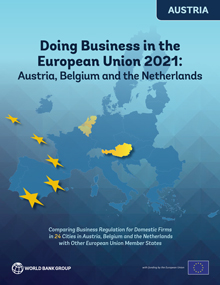Overview
Doing Business in the European Union 2021: Austria, Belgium and the Netherlands assesses the regulatory environment for businesses and its impact on local entrepreneurs in 7 cities in Austria (Bregenz, Graz, Innsbruck, Klagenfurt, Linz, Salzburg and Vienna), 7 cities in Belgium (Antwerp, Bruges, Brussels, Charleroi, Ghent, Liège and Namur) and 10 cities in the Netherlands (Amsterdam, Arnhem, Eindhoven, Enschede, Groningen, The Hague, Maastricht, Middelburg, Rotterdam and Utrecht). The study measures regulations relevant to five stages in the life of a small to medium-size domestic firm: starting a business, dealing with construction permits, getting electricity, registering property, and enforcing contracts. In each of these areas, the study highlights good practices that can be leveraged to empower local entrepreneurs and firms.
Doing Business in the European Union is a series of subnational studies requested and funded by the European Commission, Directorate-General for Regional and Urban Policy, and produced by the World Bank Group. Previous editions, covering cities from Bulgaria, Croatia, the Czech Republic, Greece, Hungary, Ireland, Italy, Portugal, Romania, and Slovakia, were released in 2017-2019.
Where is it easier to do business in Austria?
Main findings
- No single city does equally well on all five indicators. Linz leads in getting electricity and registering property, Salzburg in starting a business, Bregenz in dealing with construction permits, and Vienna in enforcing contracts.
- There are good practices to be found across many of the cities measured. All seven cities lead in at least one indicator category. Vienna enjoys the highest number of top performances, leading in five indicator categories.
- Subnational variations in the Doing Business score are most significant in construction permitting, enforcing contracts, and getting electricity. These disparities can help policymakers identify which cities have good practices that other cities can adopt and make improvements without major legislative overhaul.
- Time is the dimension that varies the most across the five indicators. Bregenz registers the fastest turnaround times overall, and Klagenfurt the longest. Entrepreneurs in Klagenfurt spend almost 7 months longer than their peers in Bregenz complying with the bureaucratic requirements in the five measured areas. Nevertheless, even in Klagenfurt, the total time is 3.5 months faster than the EU average.
- In the long run, Austrian cities can look for good practices outside the country to further improve their business regulations. This would be particularly beneficial for the starting a business area, the only indicator where all Austrian cities perform below the EU Doing Business average.
Note: Data for Vienna, as well as for comparator economies and regional averages, are not considered official until published in the Doing Business 2021 report.

